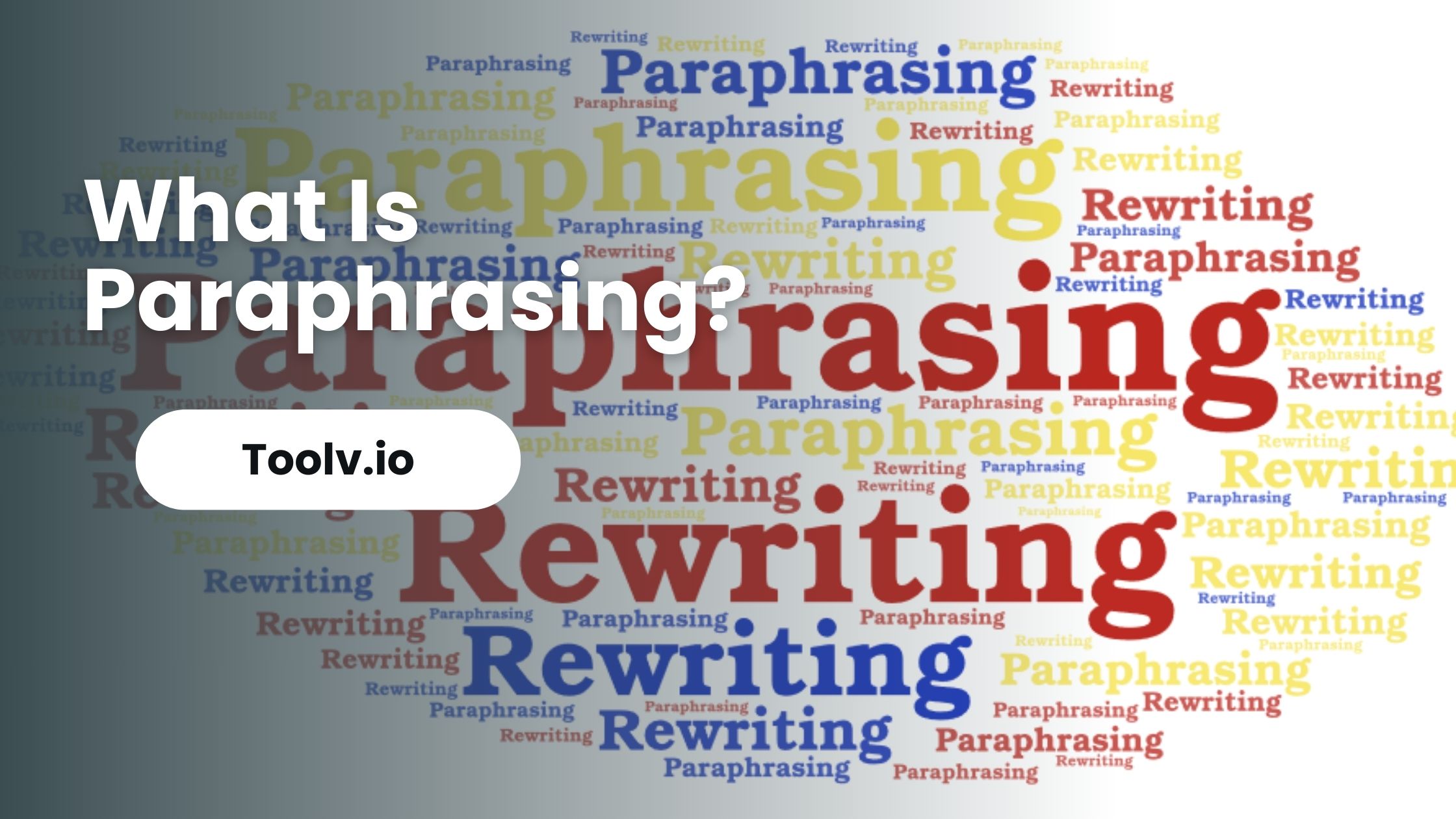Paraphrasing Tool for Clearer Academic Writing
Academic writing demands precision, clarity, and originality. However, many students and researchers struggle to express complex ideas clearly without repeating phrases or unintentionally plagiarizing sources. A paraphrasing tool offers an efficient way to rewrite sentences and paragraphs, helping users maintain their own voice while improving readability. Whether you want to simplify jargon-heavy text or rephrase ideas to avoid redundancy, such tools can become indispensable allies in crafting polished academic papers.
Using a paraphrasing tool online can greatly reduce the time spent rewriting content manually. These tools are designed to analyze sentence structure and substitute words with appropriate synonyms, all while keeping the original meaning intact. This capability becomes particularly useful when you need to rephrase content for assignments, thesis work, or research summaries. The convenience of an easy-to-use digital solution enables more focused efforts on research and critical analysis rather than repetitive wording.
How a Paraphrasing Tool Enhances Academic Writing Clarity
Clear communication is vital in academia, and this is where a sentence rephraser shows its strengths. Often, ideas get lost in overly complex or tangled sentences. A sentence rephraser helps untangle these by restructuring sentences to be simpler and more direct. This makes the argument more persuasive and easier to understand for readers of varying expertise levels.
Moreover, academic writing requires adhering to formal tone and style. The wrong choice of words or sentence construction may make a paper seem amateurish or confusing. A rewording tool assists by offering alternative expressions that better fit the scholarly tone. It ensures that sentences flow naturally while preserving the nuance of the original text, a critical factor when explaining intricate theories or concepts.
Academic writers also benefit from the ability to rework paragraphs efficiently. A paragraph rewriter tool takes larger blocks of text and reconstructs them to avoid monotony and repetition. This is especially important in literature reviews or discussion sections, where presenting the same idea from different angles is common. Using a paragraph rewriter helps maintain reader engagement without sacrificing content quality.
Avoiding Plagiarism with the Help of AI Paraphrasing Tools
Plagiarism is a major concern in academic circles, often leading to serious consequences. Employing an ai paraphrasing tool can reduce this risk by generating unique phrasing for borrowed ideas while preserving their original meaning. Unlike manual rephrasing, AI tools use advanced algorithms to intelligently substitute words and rearrange sentence structures, creating fresh versions that pass plagiarism checks.
Additionally, many institutions now use AI content detection software, making it more important than ever to rely on credible paraphrasing tool free services that ensure your writing remains original and authentic. The right tool can produce natural-sounding rewrites that are difficult to detect as machine-generated, thereby helping you maintain academic integrity.
Integrating an ai paraphrasing tool into your writing workflow not only safeguards against plagiarism but also enhances your ability to present complex information succinctly. This balance between originality and clarity is essential for effective academic communication.
Practical Uses of Paraphrasing Tools in Research and Assignments
When working on research papers, students often gather information from multiple sources. A paraphrase online utility enables them to synthesize data by rephrasing excerpts into their own words. This process supports better understanding and assimilation of content, making it easier to construct cohesive arguments.
The ability to rewrite text efficiently is also valuable when preparing multiple drafts or versions of an essay. Using a rewriter tool speeds up this process by providing different formulations of the same idea. This helps writers refine their work progressively, testing which variations best suit the paper’s tone and structure.
For non-native English speakers, a reworder can be a game-changer. Academic English often uses vocabulary and phrasing unfamiliar to ESL learners. A reliable rewording tool helps by offering clearer alternatives that fit academic standards while enhancing readability. This leads to more confident writing and fewer language barriers.
The Role of Sentence Changers and Word Rephrasers in Improving Style
Sometimes academic sentences become lengthy or overly formal, hindering reader comprehension. A sentence changer tool breaks down complex sentences into more manageable parts without losing meaning. This makes the content easier to digest and follow, especially in subjects that involve technical descriptions or statistics.
Meanwhile, a word rephraser focuses on swapping specific terms with suitable synonyms or related phrases. This fine-tuning of vocabulary improves diversity in word choice, preventing repetition that can bore readers or weaken arguments. In scholarly writing, this subtle enhancement often separates average papers from outstanding ones.
Effective use of both sentence changer and word rephraser tools allows writers to tailor their style according to their audience. Whether preparing for peer review or presenting at conferences, polished language with varied sentence structures and vocabulary elevates the quality of communication.
How to Choose the Best Paraphrasing Tool for Academic Needs
With many options available, selecting the best paraphrasing tool requires understanding your specific writing needs. Factors to consider include accuracy, ease of use, and the ability to maintain original meaning. Tools that offer features like plagiarism detection integration and multiple rewriting modes tend to be more versatile.
An ideal paraphrasing tool online also supports bulk text processing, which is useful when working on long research documents. Additionally, access to a paraphrasing tool free version can help users test capabilities before committing to premium services. Evaluating user reviews and trying demos are practical steps in making an informed choice.
It’s also beneficial to use a tool that complements other writing utilities, such as grammar checkers or content detectors. For example, pairing a paraphrasing tool with a PDF splitter enables seamless handling of source materials, while checking rewritten text with an AI content detector ensures originality and quality.
Expanding Academic Writing Skills with a Paraphrase Generator
Using a paraphrase generator goes beyond just rewriting; it’s a learning aid. By comparing original text with its rephrased counterpart, writers can study alternative sentence constructions and vocabulary usage. This exposure helps build stronger writing skills over time.
A paraphrase generator also encourages critical thinking by prompting users to evaluate which versions better convey their intended meaning. This interaction fosters deeper engagement with the material, a key aspect of scholarly research.
Moreover, when writers face writer’s block or struggle to find the right words, a rephrase tool offers inspiration and direction. This support can make the difference between procrastination and productive writing sessions.
Addressing Common Challenges with Paraphrasing Tools
Despite their advantages, paraphrasing tools have limitations. Some may produce awkward phrasing or subtle meaning shifts if not carefully reviewed. Therefore, human oversight remains essential to ensure academic accuracy.
Occasionally, a tool might struggle with discipline-specific jargon or idiomatic expressions. In such cases, manual adjustments are necessary to maintain the integrity of the argument. Writers should use paraphrasing as a complementary aid rather than a complete substitute for careful writing.
Understanding these challenges helps users set realistic expectations and adopt best practices, such as double-checking rewritten content for coherence and context.
Using Paraphrasing Tools Responsibly in Academia
Ethical use of paraphrasing tools is crucial to uphold academic standards. The goal should be to assist personal expression and clarity, not to mask copied work. Proper citation and acknowledgment of sources remain mandatory, even when content is reworded.
Students and researchers should also be cautious about over-reliance on automated tools, which can reduce engagement with the material. Active participation in rewriting encourages deeper comprehension and original thought.
Combining paraphrasing tools with other resources like a rephrase online platform ensures balanced writing practices that respect intellectual property while improving communication.
Additional Writing Enhancements with Sentence Rephrasers and Reword Generators
Integrating a sentence rephraser or reword generator into your writing toolkit can streamline the editing process. These tools provide quick alternatives to awkward sentences, enhancing tone and readability.
By experimenting with a rewrite my paragraph feature, writers can produce fresh takes on existing drafts, ideal for avoiding repetition or adjusting formality levels. This flexibility is valuable in academic environments where different sections require varied styles.
Similarly, using a reword my sentence tool allows for pinpoint changes, making it easier to meet word count limits or adhere to journal guidelines without losing substance.
How Paraphrasing Tools Support ESL Writers
For many non-native English speakers, academic writing poses language and stylistic hurdles. A paraphrasing tool online offers tailored assistance by suggesting natural English expressions, reducing grammatical errors, and improving overall fluency.
This support builds confidence, enabling ESL writers to focus on content quality rather than language barriers. Over time, exposure to well-structured rephrases helps internalize academic conventions and vocabulary.
Combining paraphrasing tools with language learning resources accelerates progress and contributes to academic success.
Streamlining Content Creation for Academic Presentations
Preparing presentations often requires condensing dense academic text into concise, clear speech. A rephrase tool can convert written paragraphs into more accessible language suited for verbal delivery.
This transformation helps presenters engage audiences effectively without sacrificing detail. Additionally, a rewording tool aids in creating handouts or summaries that reinforce key points.
In this way, paraphrasing tools contribute not only to written assignments but also to successful oral communication in academia.
Frequently Asked Questions (FAQs)
What is a paraphrasing tool?
A paraphrasing tool rewrites text by changing words and sentence structure while keeping the original meaning intact.
Can a paraphrasing tool help avoid plagiarism?
Yes, it generates unique content versions that reduce plagiarism risks, but proper citations are still necessary.
Is using a paraphrasing tool ethical in academic writing?
Using it as a support tool to improve clarity and expression is ethical, provided sources are credited correctly.
How does a sentence rephraser differ from a paragraph rewriter?
A sentence rephraser changes individual sentences, while a paragraph rewriter restructures entire paragraphs for better flow.
Can paraphrasing tools assist ESL writers?
Absolutely, they help non-native speakers produce clearer and more natural English in academic writing.
Conclusion
The demand for clear, original, and well-structured academic writing continues to grow. Utilizing a paraphrasing tool can make this process more manageable by simplifying complex sentences, ensuring plagiarism-free content, and improving overall readability. Whether you are a student, researcher, or non-native English writer, these tools serve as valuable partners in refining your work.
Integrating such a tool into your writing routine complements critical thinking and helps you express ideas with precision and confidence. For an accessible and powerful option, explore the paraphrasing tool designed to meet the diverse needs of academic writers today.



